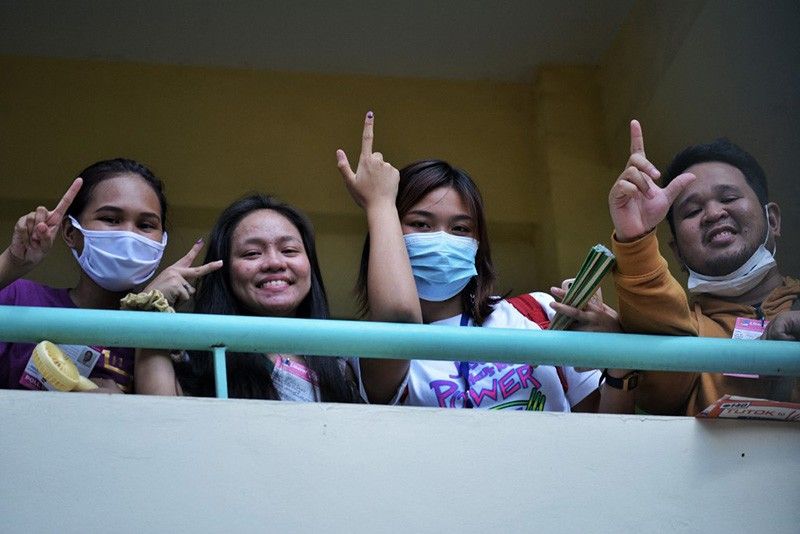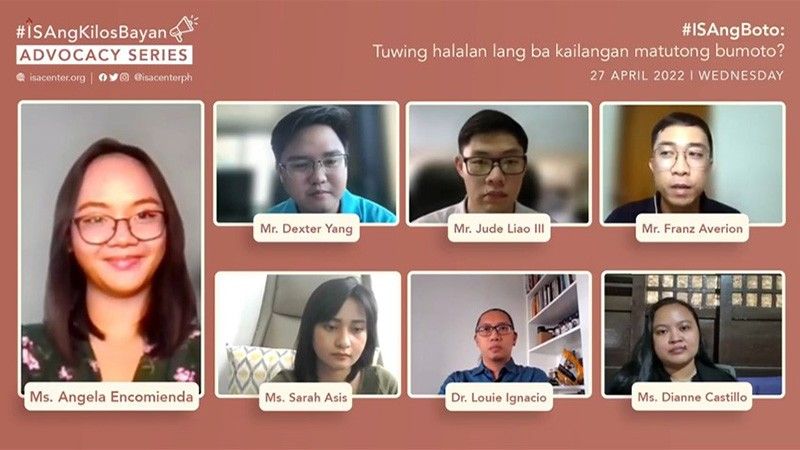‘You be the change’: Youth groups talk nation-building beyond election

MANILA, Philippines — Each election period brings an opportunity to make deliberate choices, defining our future as a nation. But due to public distrust in the Philippine political system, the deeply-rooted patronage system in our local politics, and the lack of voter education, many Filipinos still find themselves unmotivated to practice their right to suffrage.
Less than a month before the 2022 national elections, the Institute for Solidarity in Asia (ISA) aspired to create a safe space for discourse on the importance of voter education even beyond the election period. On April 27, ISA conducted a webinar entitled, "#ISAngBoto: Tuwing halalan lang ba kailangan matutong bumoto?", under its #ISAngKilosBayan Advocacy Series to explore ways to embed civic and voter education in Philippine culture and underscore the power of the youth vote in nation-building.
Panelists for this webinar included GoodGovPH Executive Director Dexter Yang, Parish Pastoral Council for Responsible Voting (PPCRV) Director of Youth Affairs Jude Manuel Liao III, National Youth Volunteers Coalition Co-Founder, and CEO Franz Reimart Averion. Joining them as reactors were University of Santo Tomas Sociology Faculty Dr. Louie Benedict Ignacio; Far Eastern University Communication Faculty Dianne Castillo; and Commission on Elections Information Officer II Sarah Jane Asis. YouthVote Philippines National Youth Convenor Angela Encomienda moderated the discussions for this webinar.

The speakers talked about the effects of the ongoing public health crisis, the current political environment, and how the prevalence of misinformation and disinformation on social media has affected Filipinos' voting knowledge and behavior. They discussed the danger of personality-based politics overriding issues as this does not help the country confront and resolve its problems.
“We've seen how Philippine democracy has actually evolved throughout the years, and that evolution includes how our politics has continuously become personality-based instead of issue-based,” said Yang.
“We've seen how citizens become more reliant on social media, where fake news and disinformation are twisting narratives. And for some, it has become their facts.”
Speakers emphasized that educating the youth, particularly in schools and within families, would be an excellent way of planting seeds of civic responsibility. Asserting one's right to vote was also articulated as equivalent to maintaining the existence of democracy in the country.
“I believe that the best institution is still the family,” Liao said. “And, again, it's the family that really brings people together and spurs people into action. So hopefully, for us in the Philippines, we find more ways to engage more families.”
Panelists raised the issue of culture and how it warrants the country's attention because it anchors values that influence how Filipinos choose their leaders. On the role of different media types in elections, panelists agreed that thinking critically and checking facts have become more necessary because of the plethora of information–credible or otherwise–Filipinos are exposed to and consume.
“Meron tayong national news, we have local news and regional news in different parts of our country. Majority has access to the social media...but not everyone,” Averion said. “There are still...parts of our country that is not being reached by the media or the news. There are credible media outlets [and] there are social media pages that are taking themselves as a credible news source. So what's really important is our critical thinking and our way to really fact check the information that the media is showing.”
They also delved into the significant events in the media landscape that affected current political dynamics and the institutions that greatly affected the youth's level of political participation. Other concerns ranged from possible measures in managing political inaction among the youth, voting issues of persons deprived of liberty (PDLs), and general unease about the elections due to the pandemic.
To cap off the event, the speakers called on Filipinos to vote in the elections. They reminded the youth to assert their rights as they now make up a large percentage of the voting population, that Filipinos must remain vigilant because of the pervasive nature of misinformation and disinformation, and that responsibilities as citizens go beyond the elections.
Ignacio advised non-government organizations to further lobby for better civic and voter education, while Castillo challenged the youth to act: "If you want change, kayo mismo dapat ang magiging pagbabago ngayon."
(If you want change, you have to be the change now)
- Latest
























